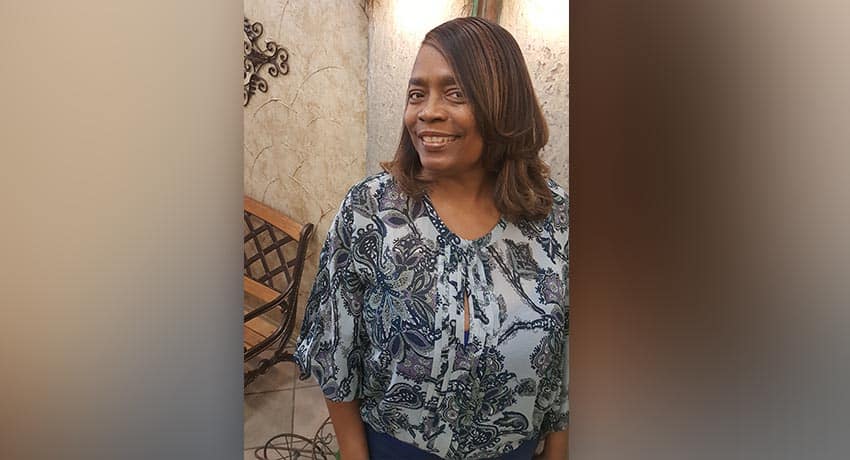Naomi Wesson is no stranger to pain. At age 4, she was diagnosed with sickle cell anemia, a hereditary disorder of the blood caused by abnormal hemoglobin, the oxygen-carrying protein within red blood cells. Wesson, now 63, has learned to manage her disease and, as a result, is living and loving life. In honor of Sickle Cell Awareness Month, Wesson’s share her personal journey with others.
“I always say that I’m a walking, talking miracle,” said Wesson, who teaches developmental reading and writing. “Most patients rarely live past the age of 35, but I have defied those odds.”
Throughout her life, Wesson, like other sickle cell patients, has experienced what is referred to as sickle cell crisis, pain that begins suddenly and can last several hours or even for several days. It occurs when the misshapen red blood cells block small blood vessels that carry blood to the bones.
Patients may feel pain in their backs, knees, legs, arms, chest, or stomach. These attacks can lead to hospitalizations, which sometimes last between five and eight days.
“It’s like having a toothache in your bones,” said Wesson. “It’s often sharp, throbbing pains and can impact your joints and organs.”
Despite these painful episodes, Wesson said she was able to live a relatively healthy life growing up. As she got older, she experienced more attacks but recently has put into place self-care measures that have significantly reduced the frequency of the pain crises.
“I try not to let sickle cell disease be a hindrance. If I’m tired, I rest. I eat right, stay hydrated, and avoid stress as much as I can,” Wesson said. “I also make time for my hobbies, which include writing, crocheting, scrapbooking, and reading.”
Last December, Wesson relocated to Houston from the Dallas area to be close to her daughter. She says being close to family, which includes four children and five grandchildren, has brought her much peace and reduced her anxiety.

Since moving to Houston, she started seeing Modupe Idowu, MD, a hematologist with UT Physicians and associate professor of hematology at McGovern Medical School at UTHealth.
“Naomi had pain crises as often as six or seven weeks,” Idowu said. “Since relocating to Houston to be close to her daughter, the frequency of her crises has decreased significantly. She has a remarkable outlook that has helped her manage the disease quite well.”
Idowu explained that even something as routine as a change in the weather or the common cold can bring on a crisis, so taking care of themselves is critical for patients to manage this disease. To help keep her red blood cells reproducing, Wesson receives an injection once a month and now has a “power port” to receive blood and medications.
“I want to encourage younger people with sickle cell that they can lead a quality life and live past middle age,” said Wesson. “If you eat well, stay hydrated, get rest, and stay current with your checkups and vaccinations, you can live a decent life.”
Wesson’s self-care routine also includes a positive attitude.
“You have to do everything you can to find distractions from the pain,” she said. “Laughter is good for the soul.”



